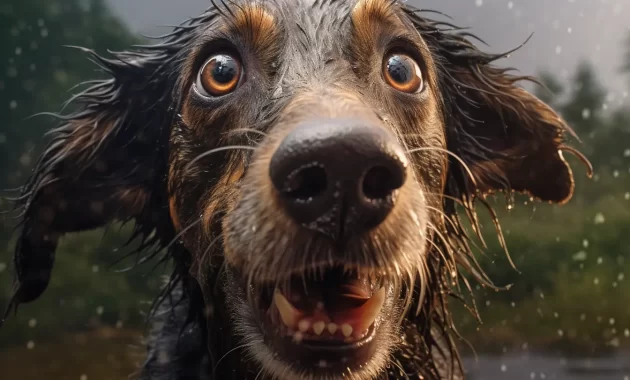
Does your pup have had an excessive amount of drool lately? It’s perfectly normal for a dog to drool, but if you’ve noticed that your furry friend seems to be drooling more than usual, something might be wrong.
In this article, we’ll discuss why your canine companion may produce more saliva than usual and what you can do about it.
Drooling is the body’s way of cleaning and keeping the mouth healthy.
When something is off the balance in the mouth, like if there’s a foreign object stuck in there or an infection present, the body will produce more saliva to help flush out the area and restore equilibrium.
If you suspect something is causing your pup to drool excessively, it’s time to take them to the vet for a check-up.
Table of Contents
- Foreign Objects
- Infections
- Allergies
- Stress And Anxiety
- Medications
- Frequently Asked Questions
- Conclusion
Foreign Objects
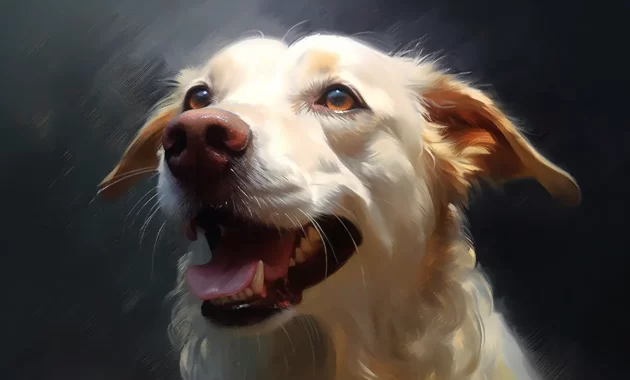
It’s natural for dogs to drool, but if your pup is drooling more than usual, it’s worth investigating the cause.
There are many possible reasons why your dog may be drooling excessively, such as foreign objects stuck in the mouth or an underlying medical condition.
Anything from small toys to large sticks can get lodged in your pup’s mouth or throat regarding foreign objects.
If you suspect an object is stuck, look inside your dog’s mouth and see if you can spot something that shouldn’t be there.
If you can’t find anything, it may be time to take him to the vet for further examination.
Even if you don’t find foreign objects, it’s essential to rule out other medical causes of excessive drooling.
One of these health-related causes could be heat exhaustion, which is especially common during hot summer months.
As temperatures rise, pets become more prone to dehydration leading to excessive panting and salivation.
Other conditions that could lead to drooling include dental disease and oral injuries caused by chewing on complex objects.
Regardless of the cause, you must address the issue immediately so your furry friend can feel better!
Infections
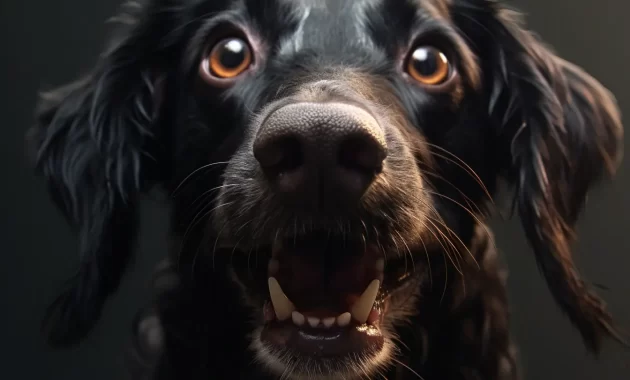
Although foreign objects commonly cause drooling, infections can also increase salivation.
The disease can cause serious medical issues beyond excessive drooling without proper diagnosis and treatment.
The two main types of infections that may lead to drooling are dental disease and heat stroke. Dental disease occurs when bacteria build up in the mouth, leading to swelling and inflammation of the gums.
Heat stroke occurs when a dog is exposed to excessively high temperatures for an extended period. Both conditions can be painful and increase drooling.
| Condition | Symptoms |
|---|---|
| Dental Disease | Swollen/inflamed gums, bad breath, difficulty chewing |
| Heat Stroke | Excessive panting, rapid breathing, lethargy |
It’s essential to take your dog to the vet if you suspect they have an infection causing their drooling so that they can be treated appropriately.
Your vet will do a physical examination and run blood tests to diagnose the problem and prescribe a course of action. With prompt treatment, dogs should fully recover from dental disease or heat stroke with no long-term effects.
For these reasons, pet owners must closely monitor their canine companions for any signs of illness or distress that an infection could cause.
Allergies
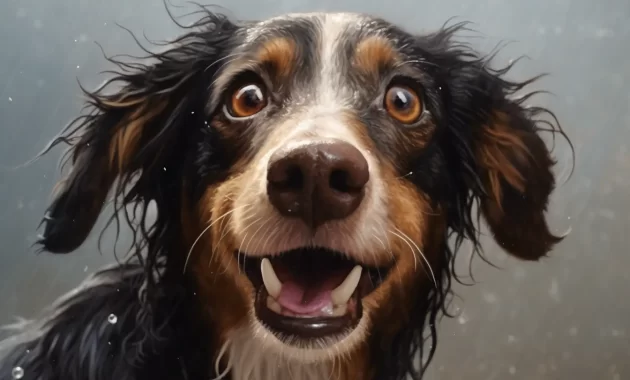
Excessive drooling can be an indication of underlying health issues in your pet. Allergies commonly cause increased salivation, especially if accompanied by other symptoms such as itching, redness or swelling.
If your pup displays any of these signs, it’s essential to take them to the vet for a complete examination.
Overheating can also cause heavy drooling and panting in dogs. If your pet becomes too hot, it may produce more saliva than usual as its body attempts to cool down.
Keep an eye on their behaviour when out in the sun, and ensure you provide plenty of water and shade so they don’t overheat.
Dietary changes can also affect the amount of saliva produced by your dog. If you have recently switched up their food, this could be why they are drooling more than usual.
Try monitoring how much they eat and look out for any unusual behaviour after meals – if this persists, it’s worth consulting a vet to ensure everything is okay.
When it comes to excessive drooling, it’s best to err on the side of caution and get a professional opinion from your veterinarian, who can diagnose any underlying health issues quickly and efficiently.
They will also be able to advise on how best to keep your pup healthy and happy going forward!
Stress And Anxiety
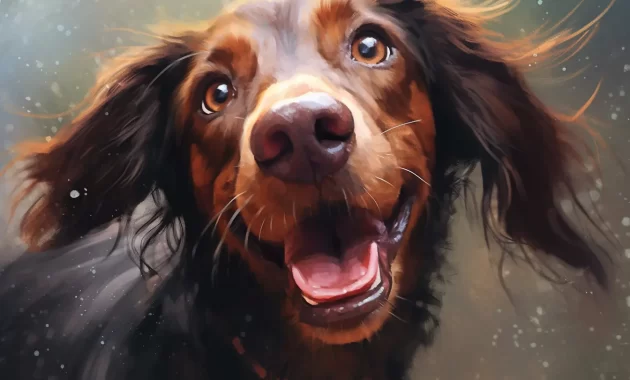
As the saying goes, ‘A wet nose is a sign of good health’, but excessive drooling can indicate something is wrong with your pup. While allergies may be the culprit, other causes of excessive drooling in dogs should be considered.
Stress and anxiety can lead to increased salivation and are often accompanied by additional symptoms such as excessive panting and low energy. Dogs experience stress and anxiety-like humans do, and this state can manifest itself through physical symptoms.
If you’ve noticed that your dog’s drooling has increased drastically or showing signs of stress, such as panting excessively or having low energy levels, it could indicate they’re feeling anxious or stressed.
It’s essential to identify what might be causing your dog to feel this way and take steps to reduce their stress levels before it starts impacting their overall health and well-being.
It’s normal for dogs to show signs of nerves when faced with unfamiliar situations, but if these feelings persist for more than a few days, it’s time to take action.
You can use various methods to help reduce your dog’s stress, including providing regular exercise and mental stimulation, introducing calming aids such as music or pheromones, or attending professional behavioural training sessions together so that you can learn how best to manage your pet’s anxiety.
Taking proactive steps now will ensure your pup stays healthy and happy long into the future.
Medications
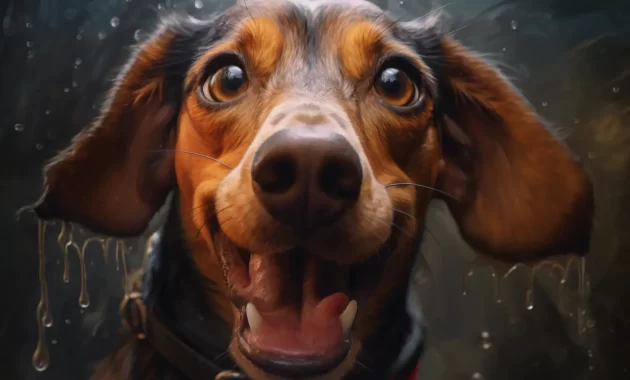
Medications can be a possible cause of excessive drooling in dogs. If your pup is on any medication, it is essential to check the side effects list to determine if abnormal salivation is listed.
Common medications for skin allergies, heartworm prevention, and pain relief can all have drooling as a potential side effect. Additionally, if your dog has been diagnosed with any dental disease or heat stroke, it may be prescribed medications that could increase drooling.
It is important to note that certain medical conditions can also cause excessive drooling in dogs. For example, dental disease and heat stroke can often lead to increased saliva production in dogs.
In the case of dental disease, this happens because of the pain associated with the condition, which causes the dog to salivate more than usual. Heat stroke can also cause an increase in saliva production due to dehydration or other issues associated with overheating.
Therefore, before assuming that medication is responsible for your pup’s increased salivation level, it would be best to consult your veterinarian first and get their professional opinion on what might be causing the issue.
They can provide insight into potential medical conditions like dental disease or heat stroke that could be contributing factors and recommend any necessary tests or treatments for those conditions.
Frequently Asked Questions
Is Excessive Drooling In Dogs Normal?
Excessive dog drooling is surprisingly common and can be brought on by various environmental triggers.
Fearful drooling is one of the most common reasons for increased saliva production, but other conditions like allergies, infections and diet can also play a role.
If you’re concerned that your pup’s excessive drooling could indicate something more severe than being scared, it’s best to consult your veterinarian.
They can diagnose the underlying cause and advise you on the best action.
What Can I Do To Reduce My Dog’s Drooling?
Various factors can cause excessive dog drooling and vary significantly depending on the breed.
To reduce your pup’s drooling, it is essential to understand what is causing it.
Possible causes include allergies, infections, dental problems, or anxiety.
Allergies and infections can be treated with medicine from your veterinarian, while dental issues might require a professional cleaning or other intervention.
Anxiety can often be managed through behaviour modification techniques like desensitization and counter-conditioning.
By assessing the underlying cause of your dog’s excessive drooling, you can take steps to reduce it and help your pup feel more comfortable.
How Can I Tell If My Dog Is In Pain?
Is your pup in pain? It can be hard to tell, but a few telltale signs can help you identify if your furry friend feels discomfort.
From how they walk and vocalize to changes in their eating and sleeping habits, these pain symptoms can be subtle yet powerful indicators that your puppy needs proper care and attention.
Knowing how to recognize the signs of pain is essential for effective pain management for your four-legged companion. With a bit of vigilance, you’ll be able to ensure that your pup enjoys a life free from distress and discomfort.
Are There Any Dietary Changes That Could Help Reduce My Dog’S Drooling?
If your pup is drooling more than usual, it may be helpful to look at their diet.
Switching to a higher-quality food specifically designed for dogs can help reduce the amount of saliva they produce.
Additionally, brushing their teeth regularly can help keep their mouth clean and reduce the amount of drooling.
This could also prevent gum disease, often caused by plaque buildup on their teeth.
If you’re unsure what type of food or toothbrush to get for your dog, consult your vet – they are always happy to help!
Is There A Way To Prevent My Dog From Drooling So Much?
Excessive drooling in dogs can be a sign of an underlying medical condition or an indication of something they ate.
It’s essential to identify the cause of your dog’s drooling so that you can take the necessary steps to prevent it from happening again.
Common causes include allergies, toxic substances, and dietary changes. If your pup has ingested something poisonous, seek immediate medical attention.
If you suspect an allergy, take your dog to the vet for a proper examination and discuss possible treatments such as antihistamines or changing their diet.
Finally, monitor your pup’s eating habits and avoid feeding them anything that might trigger excessive drooling. With these steps in place, you’ll be able to identify and prevent potential causes of excessive drooling from occurring in your beloved pet.
Conclusion
Excessive drooling is often a sign that something is wrong with your dog. If you are concerned about your pet’s drooling and the cause of it, it is essential to contact your veterinarian for an examination.
Your vet can properly diagnose any underlying medical conditions that may be causing excessive drooling and provide you with the necessary treatment plan.
To prevent your dog from drooling too much, it is essential to keep an eye on their diet and make sure they get plenty of exercise.
Additionally, if your dog is experiencing pain or discomfort, this could contribute to excessive saliva production.
Have you noticed any changes in behaviour that could point to a potential health issue? Monitoring your pup’s health can help ensure they are happy, healthy, and drool-free!




